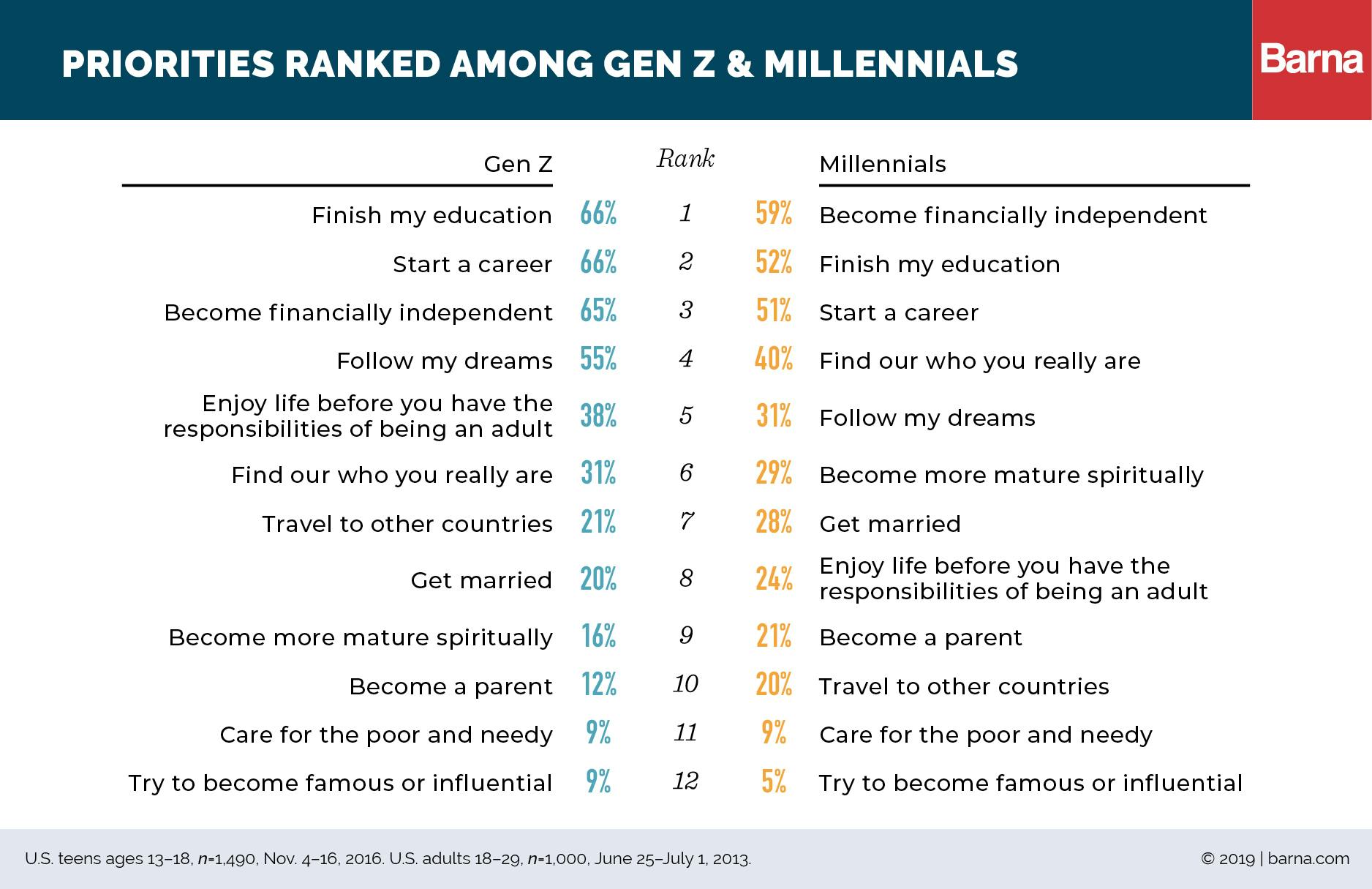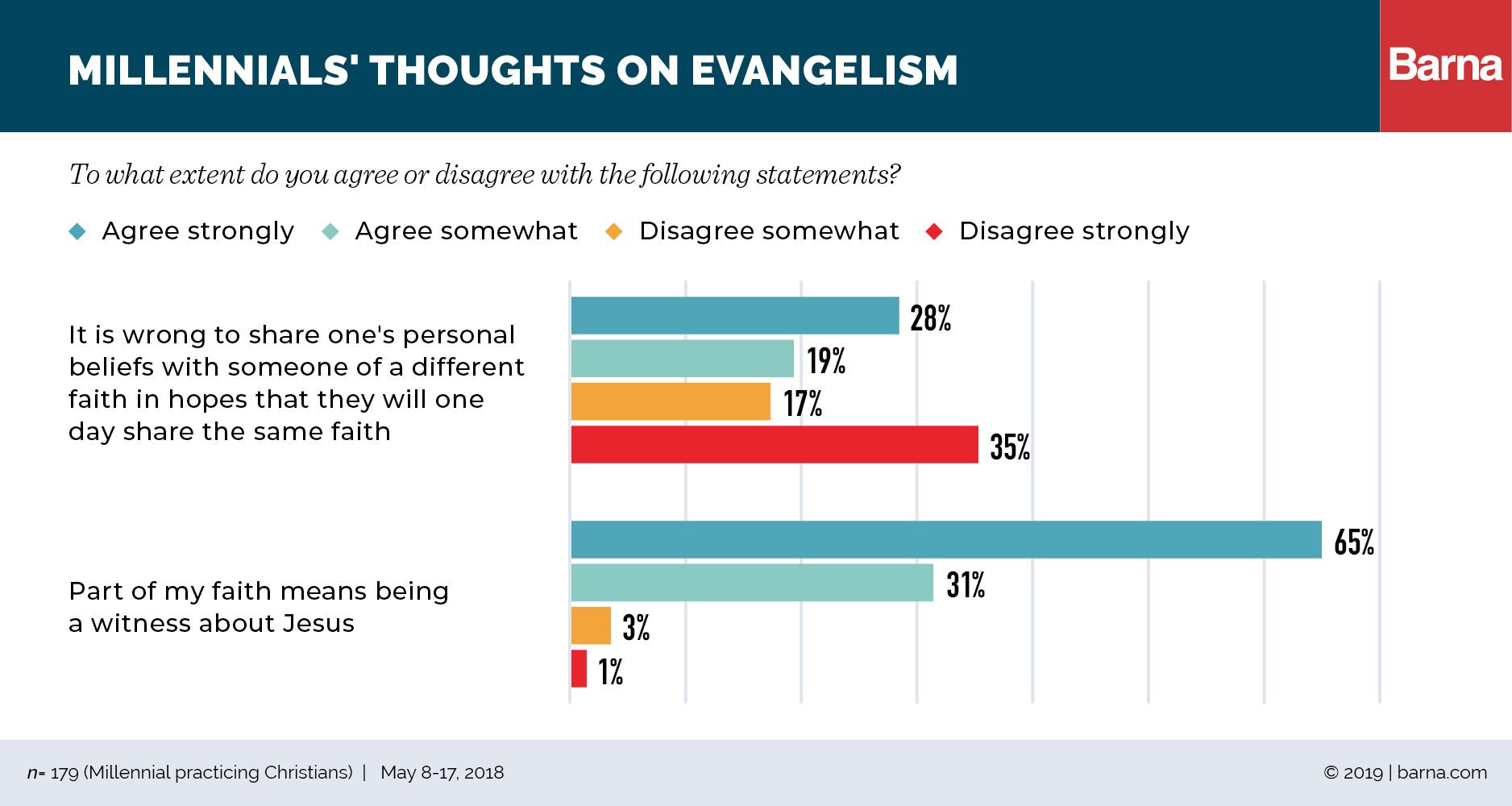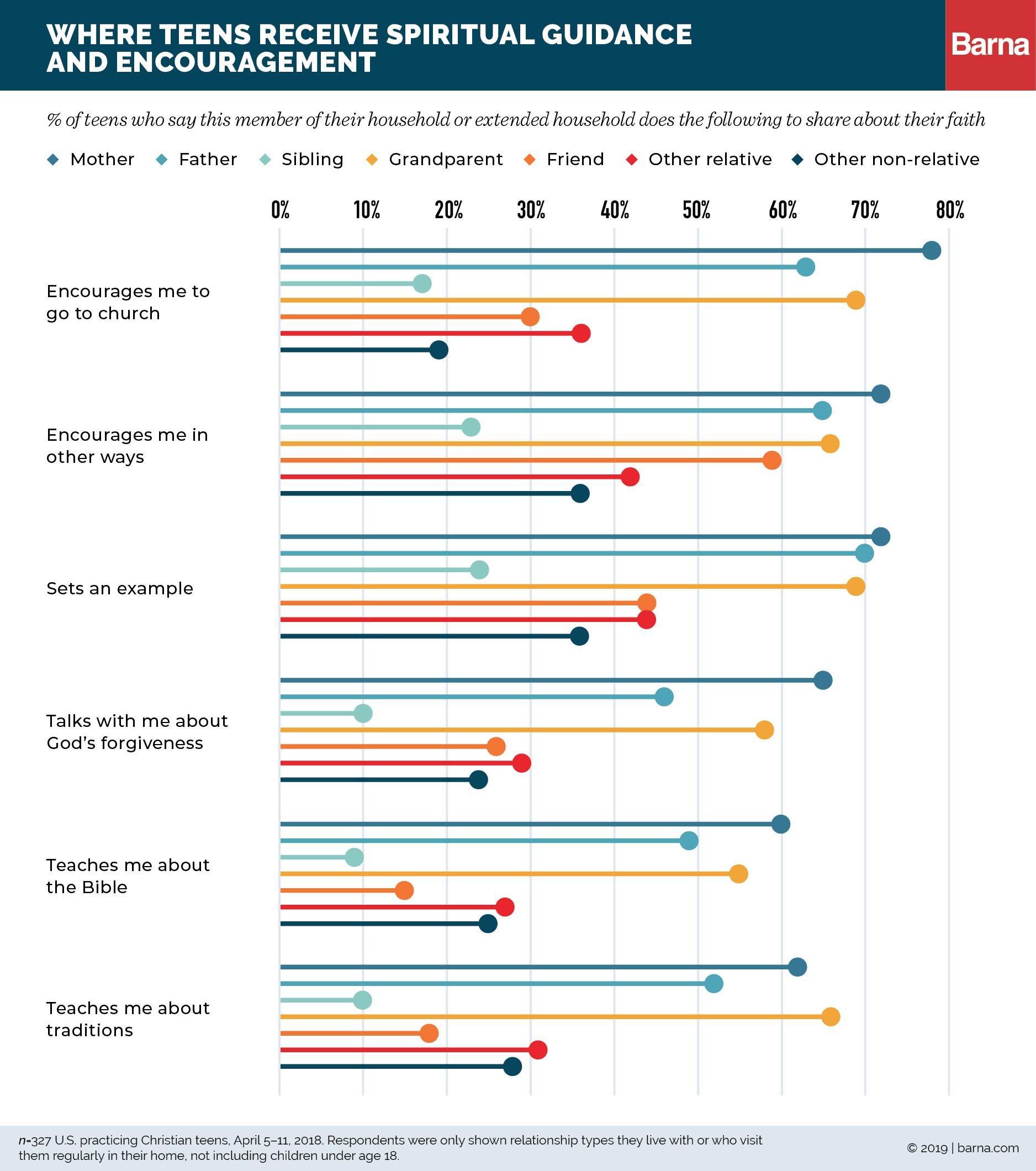
Over the last decade and a half, one of Barna’s primary missions has been to understand emerging generations—specifically Gen Z and Millennials in the United States—and discover how to best equip them to grow and share their faith. In the process, Barna has interviewed nearly 100,000 teens and young adults to learn more about their worldview, especially surrounding Christianity, religion and culture. This fall, we’ll expand the scope of this inquiry to a global level at Faith for the Future, a free webcast revealing findings from an international study of 18–35-year-olds conducted in partnership with World Vision.
Sign up for Faith for the Future, a free, live webcast happening on September 10.
As Barna deepens our understanding of the next generation and what they’re bringing with them into adulthood, we are also reflecting on some of the many conversations we’ve had with faith leaders about the bigger questions surrounding Millennials and Gen Z. Below, we revisit several crucial insights from our recent reports.
The Connected Generation
How Christian Leaders Around the World Can Strengthen Faith & Well-being Among 18-35 Year-Olds
Spiritual Maturity Ranks Low on List of Priorities for Gen Z & Millennials
John A. Murray on Gen Z’s Sense of Self
John Murray is Founder and President of Imago Dei Leadership Forum and a leader in academia with over two decades of independent school experience in teaching and administration as Head of School. He is author of the newly released e-textbook, In Whose Image?
As George Barna has shown, a person’s worldview is most often in place by the time they reach the age of 13. In light of this research, over the past six years I have developed the first part of a textbook for eighth-grade students around six questions to help them better understand themselves and others as God’s image-bearers. These questions speak to what Gen Z is identifying as important to their sense of self—and give Christian educators a segue to help teens explore what it means to be an image-bearer of God.
Who am I? To be made in the image of God means we are set apart from the rest of creation, “a little lower than the angels,” as King David wrote in Psalm 8. David praises God for his creation: “For you created my inmost being; you knit me together in my mother’s womb. I praise you because I am fearfully and wonderfully made.” Grasping this biblical perspective helps students see their essential worth in a new light.
How does the media influence me? Given the amount of media teens are exposed to by the time they turn 18, Christian educators must also help students comprehend 1) how it influences them, 2) what their vulnerabilities are and 3) how to discern the worldviews behind the media.
What is my identity? When students see their physical selves as God’s masterpieces (see Eph. 2:10), they see themselves as God sees them. Ultimately this allows them to pursue their place and purpose in society, having an others-centered orientation and developing a genuine concern for the poor and disenfranchised.
Where did I come from? Christian educators must play a key role in demonstrating how faith and science are not mutually exclusive. Acknowledging that God created the heavens and the earth, and us as His image-bearers, Christian educators can reinforce and encourage students’ faith through the areas of science that point to an intelligent, purposeful Creator.
Where does my creativity come from? Christian educators can also expose their students to the origin of communication and the arts—particularly as they reflect the image and creativity of God. By understanding how we bear God’s image through our ability to create and communicate, students can use their gifts and talents to glorify God.
How should I view others? Self-worth crumbles when we view others or ourselves as less than we are in God’s eyes. To help students fathom the devastating effects of passive-aggressive, sexual and mean-spirited social media, and the significance of not viewing others as image-bearers, educators must give them a framework to be loving, kind, gentle, forgiving and others-centered—nurturing them to be much-needed culture-change agents in their generation.
The Connected Generation
How Christian Leaders Around the World Can Strengthen Faith & Well-being Among 18-35 Year-Olds
The Majority of Millennial Practicing Christians Take Issue with Evangelizing
Michelle Jones on Sharing Faith Through Listening
Michelle Jones is a pastor and writer serving at Imago Dei Community Church in Portland, Oregon. Michelle has a passion for women, singles, creative communities, mentorship and sound gospel teaching. Read more from her interview in Reviving Evangelism.
Listening as an act of love. Sharing faith is not a one-size-fits-all proposition. It’s not an information dump or a game of show-and-tell. It is an answer to an inquiry, an invitation to the lost and a gift offered from a place of humility and generosity.
Everything Jesus did was personal before it was anything else. He listened to what people said to him and extracted from it the cry of their hearts, their suspect motives or their uncertainties. God knows everything, yet he “inclines his ear” to us—not for his sake, but for ours. There is something kind and big-hearted in that act.
Listening makes room for people. In a culture that places high value on acceptance, this is no small thing. When we make space first for who people are, and then for what matters to them, only then can we know how to offer ourselves and our faith to them.
Listening is the first duty of a servant. Without it, he or she has no way of knowing what the “master” requires. When we share our faith, we are servants, not sages. We are the poor, holding out only what we have received by the grace of Another. And when we listen, we are giving ourselves to others—in that moment saying, “Master, what do you require?”
We are spiritually formed by and in the love of God in Christ. Evangelism is the fruit and the root of our formation. To give the grace we have been given is not only evidence of our transformation; it is itself transforming. Every opportunity to share our faith with others challenges us to live out what we say we believe. And every time we refuse to shrink away from that responsibility, we are strengthened in our faith and as a witness.
Forming Leaders for the Future of the Church
Jason Broge on Letting Young Adults Process Doubt
Rev. Dr. Jason Broge is the associate director of design and development for Lutheran Hour Ministries. Jason served as a teacher for a number of years before becoming a pastor. After obtaining his PhD in education, he went on to serve as the director of curriculum design and development for Concordia Seminary. Read more from his column in Households of Faith.
For many Christians, there are few things scarier than being cornered by someone in your household who is struggling with some fundamental doubt about faith. This fear is likely even more acute for parents who are often the first people children will bring their questions to. As Christians, we have this innate desire to protect kids from religious doubts in the hope that this will keep them within the walls of the kingdom. Yet research suggests that our desire to protect people from doubt may do more harm than good. Studies show doubt is an important part of the process in forming a healthy religious identity.
Religious doubt can lead to unbelief, but it does not have to lead to unbelief. Doubt, by its very nature, leads to both a stronger belief in something and unbelief in something else. Therefore, the question is not whether doubt will lead to unbelief, but which beliefs will be strengthened and which beliefs will be rejected. Doubt can lead to a strengthening of one’s beliefs that Jesus is the only way to heaven even as it pushes one away from a pluralistic view of the road to heaven.
Doubt is not the enemy. It is inevitable. And it is important to understand that humans cannot live in the state of doubt forever. They find a way to resolve the doubt and either strengthen the core belief or reject it for another one. They naturally seek sources to help them process and resolve doubts. They turn first to sources that are seen as safe and knowledgeable in the area.
This does not mean we need to have all the answers—but it does mean that we need to create households where people feel safe to talk about and explore their doubts with the help of loved ones.
Reverend Darrell Hall on The Importance of Allowing Young People to Serve
Reverend Darrell Hall is a campus pastor of Elizabeth Baptist Church’s campus in Conyers, Georgia. Rev. Hall’s mission is to love all people into Christlikeness through the practice and preaching of the Word. Read more from his interview in the monograph Leadership Transitions.
I first started volunteering in our congregation when I was five. Including the younger generation is a vital place to start. Younger people are capable of so much—and it prepares them for future leadership as well as present service. I’ve served in probably 15 different volunteer capacities over the years. Shoulder-to-shoulder learning—listening, leading, collaborating—is what most shaped me for my present role. There is a positive culture of training and equipping people here. In general, it’s a relational process rather than a recipe.
The Connected Generation
How Christian Leaders Around the World Can Strengthen Faith & Well-being Among 18-35 Year-Olds
Comment on this research and follow our work:
Twitter: @davidkinnaman | @barnagroup
Facebook: Barna Group
Photo by Juan Mendez from Pexels
About the Research
For the Gen Z report, two nationally representative studies of teens were conducted. The first was conducted using an online consumer panel November 4–16, 2016, and included 1,490 U.S. teenagers 13 to 18 years old. The second was conducted July 7–18, 2017, and also used an online consumer panel, which included 507 U.S. teenagers 13 to 18 years old. The data from both surveys were minimally weighted to known U.S. Census data in order to be representative of ethnicity, gender, age and region. Data from the Making Space for Millennials study was also used in the Gen Z report. This included 843 online surveys conducted among adult residents of the United States ages 18 to 29, from October 10 through October 15, 2013.The margin of error for a sample of this size is plus or minus 5.2 percentage points, at the 95% confidence level. It also included four separate nationwide studies conducted between May and August 2013. These public opinion studies were conducted using a mix of telephone and online interviewing among 4,495 U.S. adults. The maximum sampling error for any of the four studies is plus or minus 3.1 percentage points at the 95% confidence level.
Research for the Reviving Evangelism study included two nationally representative studies of US adults. The first was conducted using an online panel May 8–17, 2018, with 992 practicing Christians. In order to qualify, respondents had to self-identify as “Christian,” have attended a church service at least once in the past month and say their religious faith is very important in their life today. A similar study was conducted online with a nationally representative study of 1,001 US adults who do not meet the criteria for practicing Christians. Both lapsed Christians and non-Christians were interviewed. Both studies have margin of error of ±3 percent at the 95-percent confidence level.
The Households of Faith study began with in-depth qualitative interviews with highly active Christians of various household types: two nuclear families, one multi-generational family, one single-parent family and a roommate household. Key insights about what makes a vibrant household or how faith grows in a household setting were initially identified through this research. The results from the qualitative interviews were used to shape the questionnaire for quantitative online surveys conducted from April 5–11, 2018. In total, 2,347 interviews were conducted, including 448 with teens between the ages of 13–17. In order to qualify, respondents had to identify as Christian, agree strongly that their faith is very important in their life today and report attending a church service at least once in the past month. The margin of error for the total sample is +/- 1.8 percentage points at the 95 percent confidence level.
The Leadership Transitions report involved qualitative and quantitative research with pastors, churchgoers and U.S. adults. In initial research, an open-ended online survey was conducted in July 2017 to explore perceptions of missions and Bible translation. The 84 participants included 25 pastors, 31 practicing Christians (of any age) and 28 churchgoing Millennials. Subsequently, Barna surveyed the same types of respondents in a comprehensive online survey made up of primarily closed-end quantitative questions. These interviews were conducted in October 2017 with a nationally representative sample of 1,010 U.S. adults, as well as 619 U.S. Protestant senior pastors (senior, lead or executive roles) and 1,004 U.S. adult churchgoers (who have attended a regular church service within the past six months). An oversample of young adults contributed to a total of 692 Millennial churchgoing respondents.
© Barna Group, 2019.
About Barna
Since 1984, Barna Group has conducted more than two million interviews over the course of thousands of studies and has become a go-to source for insights about faith, culture, leadership, vocation and generations. Barna is a private, non-partisan, for-profit organization.
Related Posts

Six Reasons Young Christians Leave Church
- Church
- Generations
-
From the Archives

Will the 2020 Pandemic Accelerate Loss of Faith Among the Next Generation?
- Generations
- Leadership

How Mental Health Is the New Domain of Ministry to the Next Generation
- Generations
- Leadership

Church Dropouts Have Risen to 64%—But What About Those Who Stay?
- Faith
- Generations
-
From the Archives

Only 10% of Christian Twentysomethings Have Resilient Faith
- Faith
-
From the Archives

Over Half of Gen Z Teens Feel Motivated to Learn More About Jesus
- Faith
- Generations

Global Teens Share Their Perceptions of Jesus, the Bible & Justice
- Faith
- Generations

Two-Thirds of Americans Have Multigenerational Friendships
- Culture
- Generations
-
From the Archives

Two Key Insights to Help You Create Space for Intergenerational Ministry
- Church
- Generations
Lead with Insight
Strengthen your message, train your team and grow your church with cultural insights and practical resources, all in one place.
Get Barna in Your Inbox
Subscribe to Barna’s free newsletters for the latest data and insights to navigate today’s most complex issues.









